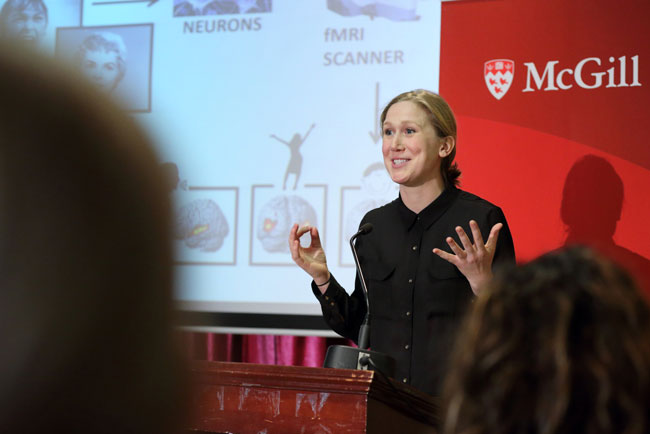
When the finalists of McGill’s 3-Minute Thesis / Ma thèse en 180 secondes competition square off in the Thomson House Ballroom on March 15, audience members will undoubtedly be impressed. Impressed not just by the brilliant research that is being highlighted, but also by the ease with which such complex subject matter can be distilled for a general audience.
But that ease and polish belie the great effort that went into preparing each presentation, and those short three minutes are actually the end result of weeks, even months, of training and practice.
“In our first sessions we see a lot of shaky, nervous people, but by the end, they are poised and confident with a well-composed presentation,” says David Syncox, Graduate Education Officer, Teaching and Learning Services (TLS). “The trajectory is tremendous.”
In conjunction with Graduate and Postdoctoral Studies and Campus Life and Engagement, TLS designed a training module for 3MT participants that began in January.
The original call attracted some 60 participants, both French and English, from downtown to Macdonald Campus. While the majority of participants are STEM students (science, technology, engineering and mathematics), there are a number of Arts and Humanity students as well.
On the English side, the competition is open to all Masters students and PhD candidates. The French competition, called Ma thèse en 180 (MT180), is open to PhD candidates. Winners will move on to represent McGill in regional competitions, with the hope to make it to the national championships.
Each participant was eligible for two training sessions prior to last month’s heats in which the finalists were determined. In order to make the sessions as beneficial as possible, they were limited to about a dozen people at a time.
During that first training session, each participant delivered his or her presentation in front of TLS facilitators, or coaches, and 3MT peers. Feedback was provided orally and in writing. Each session was also videotaped so that people could watch themselves at a later date, like an athlete watching tape in preparation for a big game.
“The focus of that first training session was working through the content. Had they memorized the material, was it structured well, did it flow smoothly?” says Jocelyne Whitehead, a PhD candidate in Neuroscience, and the Graduate Education Assistant Lead for 3MT/MT180, 2017. “The students came back two weeks later with a more polished presentation and this session was more focused on specific communications skills like eye contact and body language.”
Following the heats, the finalists received more training, but this time of the more individualized, one-on-five (coaches) variety. “That’s when we got very nitpicky because we want them to be as perfect as possible,” says Whitehead.
And if anyone knows what it takes to excel in 3MT, it would be Whitehead, who won last year’s McGill 3MT championship with her presentation on brain mapping and emotional perception. She believes the benefits of this type of program go well beyond the immediate competition.
“These training sessions are unbelievable because you’re not only working on your own presentation but you’re also working through everyone else’s with them. You get a deeper understanding of what it is to communicate really difficult concepts in a very easy manner,” she says. “If you’re doing your PhD, you’re completely focused on this very specific and sophisticated area of research. To be able to have a wider perspective and look at the different applications at how your research in astrophysics could impact someone else in another field – these are transferrable skills valued in academia and in industry.”
Syncox agrees, saying he sees this type of training as an essential part of the graduate experience. “The University has been involved in this type of presentation skills activity over the last six or seven years, but this is the first year that we’ve transitioned it into a training module,” he says. “From groundwater in China’s Yellow River to dentistry chemistry, our graduate students are brilliant and they are doing amazing research. We are helping them showcase this amazing research to a broader audience beyond the University,” he says.
The 3MT Three Minute Thesis / MT180 Ma thèse en 180 secondes Competition will take place on March 15, from 1 – 3 p.m. in the Thomson House Ballroom. All are welcome but people are asked to register in advance. The event will also be streamed live and people will be able to cast their vote for the People’s Choice Award. Get more information and register now.
